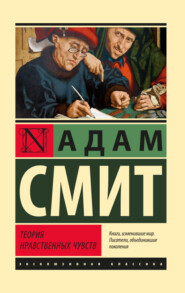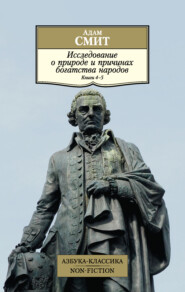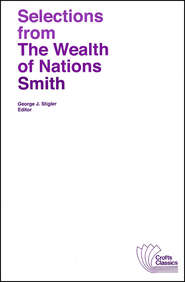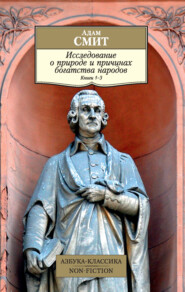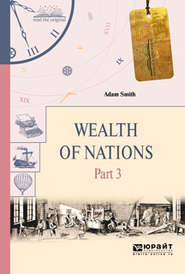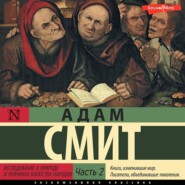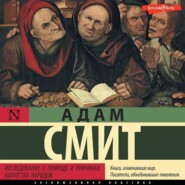По всем вопросам обращайтесь на: info@litportal.ru
(©) 2003-2025.
✖
An Inquiry Into the Nature and Causes of the Wealth of Nations
Автор
Год написания книги
2017
Настройки чтения
Размер шрифта
Высота строк
Поля
2. In supporting manufactures;
3. In buying by the gross, to sell in the same manner;
4. In buying by the gross, to sell by retail.
These four modes of employing capital are equally necessary to, and serve mutually to support, each other. The first supports, beyond all comparison, the greatest number of productive hands; the second occupies more than the two remaining; and the fourth the fewest of any.
Capital may be employed, according to the third mode, in three different ways; each contributing in a very different degree to the support and encouragement of national industry.
When capital is employed in exchanging one description of the produce of national industry for another, it then supports as great a portion of industry as can be done by any capital employed in commerce.
When it is employed in exchanging the produce of national for that of foreign industry, for the purposes of home consumption, half of it goes to the support of foreign industry; by which means, it is only of half that service to the industry of the nation which it would have been had it been employed another way.
Lastly, when it is employed in exchanging one description of the produce of foreign industry for another, or in what is termed the carrying trade, it then serves wholly for the support and encouragement of the industry of the two foreign nations, and adds only to the annual produce of the country the profits of the merchant – book 2, chap. v.
Self-interest, when left uncontrouled, will necessarily lead the proprietors of capitals to prefer that species of employment which is most favourable to national industry, because it is, at the same time, most profitable for themselves – ibid. For, when capitals have been employed in a way different from that suggested by the infallible instinct of self-interest, it has always been in consequence of the peculiar circumstances of the European governments, and of that influence which the vulgar prejudices of merchants have had over the system of administration which these governments have adopted.
The account of these circumstances, with the discussion of the errors of this system, form the matter of the third and fourth books.
Political Economy is, of all sciences, that which affords most room for prejudices, and in which they are most liable to become deeply rooted. The desire of improving our condition, that universal principle, which continually acts upon every member of the community, is ever directing the thoughts of each individual to the means of increasing his private fortune. But should this individual ever chance to raise his views to the management of the public money, he would naturally be led to reason from analogy, and apply to the general interest of his country those principles which reflection and experience have led him to regard as the best guides in the conduct of his own private affairs. Thus, from attending to the fact, that money constitutes a part of the productive stock in the fortune of an individual, and that his fortune increases in proportion to the increase of this article, there arises that erroneous opinion so generally received, that money is a constituent part of national wealth, and that a country becomes rich, in proportion as it receives money from those countries with which it has commercial connections.
Merchants who have been accustomed to retire each night to their desks, to count, with eagerness, the quantity of currency, or of good debts, which their day's sale has produced, calculating their profits only by this result, and confident that such a calculation has never deceived them, are naturally led to think that the affairs of the nation must follow the same rule; and they have been strengthened in this opinion by that unshaken confidence which a long and never-failing experience, that has been the source of wealth and prosperity, inspires. Hence those extravagant opinions respecting the advantages and profits of foreign commerce, and the importance of money; hence those absurd calculations that have been made regarding what is termed the balance of trade, the thermometer of public prosperity; hence those systems of regulations, and those oppressive monopolies, which are resorted to for the purpose of making one side of the balance preponderate; hence, too, those bloody and destructive wars, which have raged in both hemispheres, from the period in which the road to the Indies, and to the new world, became familiar to European nations.
When we observe, that the many bloody wars that have been waged in the different parts of the world for these two last centuries, and even the present war, in many points of view, have had, as their principal end, the maintenance of some monopoly, contrary even to the interest of the nation armed to protect it; we shall feel the full importance of those benefits which the illustrious author of the 'Wealth of Nations' has endeavoured to confer upon mankind, by victoriously combating such strong and baneful prejudices. But we cannot help deeply lamenting, to see how slowly, and with what difficulty, reason in all its strength, and truth in all its clearness, regain the possession of these territories which error and passion have so rapidly overrun.
The prejudices so successfully attacked by Dr. Smith, appear again and again, with undiminished assurance, in the tribunals of legislature, in the councils of administration, in the cabinets of ministry, and in the writings of politicians. They still talk of the importance of foreign and colonial commerce; they still attempt to determine the balance of trade; they renew all the reveries of political arithmetic, as if these questions had not been determined by Smith, in a way which renders them no longer capable of controversy.
It was in the midst of a country, the most deeply imbued with mercantile prejudices; the most completely subjected to its prohibitory policy, that Dr. Smith sapped the foundations of this absurd and tyrannical system; it was at the very moment when England, in alarm, saw, with terror, the possibility of a separation from her American colonies: it was then that he derided the universal fear, and proudly prophesied the success of the colonists, and their approaching independence; and that he confidently announced, what experience has since completely affirmed, the happy consequences which this separation and this independence, so much dreaded, would produce upon the prosperity, both of Great Britain and her colonies – book 4, chap. vii. part 3.
The wealth of communities is so intimately connected with their civil and political existence, that the author has been drawn by his subject into numerous other discussions, which seem more or less removed from it; and in which we discover the same sagacity of observation, the same depth of research, and the same force of reasoning.
The advantages of a complete and permanent freedom in the corn trade have never been better shown; and they have been proved by Dr. Smith, to arise from that fruitful source of wealth, the division of labour – book 4, chap. v.
The national defence and public education, two objects of very high importance, have also been discussed at length by our author.
He proves, that, in conformity to that desire to better our condition, by which all men are directed, and upon which the author has founded his whole doctrine, the teacher, whose wages are a fixed salary, will have no other end than to spare himself every trouble, and dedicate as little attention as possible to his pupils; while he that is paid in proportion to his labour, will naturally endeavour, by every means in his power, to increase his success, at the same time that he confers a great advantage on his scholars and on society. He confirms his theoretical opinions by incontestible examples – book 5, chap. i. part 3.
The superiority of regular troops over national militia is proved in theory, by the division of labour; and in practice, by the most remarkable facts in history – book 5, chap. i, part 1.
AN
INQUIRY
INTO
THE NATURE AND CAUSES
OF THE
WEALTH OF NATIONS
INTRODUCTION AND PLAN OF THE WORK
The annual labour of every nation is the fund which originally supplies it with all the necessaries and conveniencies of life which it annually consumes, and which consist always either in the immediate produce of that labour, or in what is purchased with that produce from other nations.
According, therefore, as this produce, or what is purchased with it, bears a greater or smaller proportion to the number of those who are to consume it, the nation will be better or worse supplied with all the necessaries and conveniencies for which it has occasion.
But this proportion must in every nation be regulated by two different circumstances: first, by the skill, dexterity, and judgment with which its labour is generally applied; and, secondly, by the proportion between the number of those who are employed in useful labour, and that of those who are not so employed. Whatever be the soil, climate, or extent of territory of any particular nation, the abundance or scantiness of its annual supply must, in that particular situation, depend upon those two circumstances.
The abundance or scantiness of this supply, too, seems to depend more upon the former of those two circumstances than upon the latter. Among the savage nations of hunters and fishers, every individual who is able to work is more or less employed in useful labour, and endeavours to provide, as well as he can, the necessaries and conveniencies of life, for himself, and such of his family or tribe as are either too old, or too young, or too infirm, to go a-hunting and fishing. Such nations, however, are so miserably poor, that, from mere want, they are frequently reduced, or at least think themselves reduced, to the necessity sometimes of directly destroying, and sometimes of abandoning their infants, their old people, and those afflicted with lingering diseases, to perish with hunger, or to be devoured by wild beasts. Among civilized and thriving nations, on the contrary, though a great number of people do not labour at all, many of whom consume the produce of ten times, frequently of a hundred times, more labour than the greater part of those who work; yet the produce of the whole labour of the society is so great, that all are often abundantly supplied; and a workman, even of the lowest and poorest order, if he is frugal and industrious, may enjoy a greater share of the necessaries and conveniencies of life than it is possible for any savage to acquire.
The causes of this improvement in the productive powers of labour, and the order according to which its produce is naturally distributed among the different ranks and conditions of men in the society, make the subject of the first book of this Inquiry.
Whatever be the actual state of the skill, dexterity, and judgment, with which labour is applied in any nation, the abundance or scantiness of its annual supply must depend, during the continuance of that state, upon the proportion between the number of those who are annually employed in useful labour, and that of those who are not so employed. The number of useful and productive labourers, it will hereafter appear, is everywhere in proportion to the quantity of capital stock which is employed in setting them to work, and to the particular way in which it is so employed. The second book, therefore, treats of the nature of capital stock, of the manner in which it is gradually accumulated, and of the different quantities of labour which it puts into motion, according to the different ways in which it is employed.
Nations tolerably well advanced as to skill, dexterity, and judgment, in the application of labour, have followed very different plans in the general conduct or direction of it; and those plans have not all been equally favourable to the greatness of its produce. The policy of some nations has given extraordinary encouragement to the industry of the country; that of others to the industry of towns. Scarce any nation has dealt equally and impartially with every sort of industry. Since the downfall of the Roman empire, the policy of Europe has been more favourable to arts, manufactures, and commerce, the industry of towns, than to agriculture, the industry of the country. The circumstances which seem to have introduced and established this policy are explained in the third book.
Though those different plans were, perhaps, first introduced by the private interests and prejudices of particular orders of men, without any regard to, or foresight of, their consequences upon the general welfare of the society; yet they have given occasion to very different theories of political economy; of which some magnify the importance of that industry which is carried on in towns, others of that which is carried on in the country. Those theories have had a considerable influence, not only upon the opinions of men of learning, but upon the public conduct of princes and sovereign states. I have endeavoured, in the fourth book, to explain as fully and distinctly as I can those different theories, and the principal effects which they have produced in different ages and nations.
To explain in what has consisted the revenue of the great body of the people, or what has been the nature of those funds, which, in different ages and nations, have supplied their annual consumption, is the object of these four first books. The fifth and last book treats of the revenue of the sovereign, or commonwealth. In this book I have endeavoured to shew, first, what are the necessary expenses of the sovereign, or commonwealth; which of those expenses ought to be defrayed by the general contribution of the whole society, and which of them, by that of some particular part only, or of some particular members of it: secondly, what are the different methods in which the whole society may be made to contribute towards defraying the expenses incumbent on the whole society, and what are the principal advantages and inconveniencies of each of those methods; and, thirdly and lastly, what are the reasons and causes which have induced almost all modern governments to mortgage some part of this revenue, or to contract debts; and what have been the effects of those debts upon the real wealth, the annual produce of the land and labour of the society.
BOOK I.
OF THE CAUSES OF IMPROVEMENT IN THE PRODUCTIVE POWERS OF LABOUR, AND OF THE ORDER ACCORDING TO WHICH ITS PRODUCE IS NATURALLY DISTRIBUTED AMONG THE DIFFERENT RANKS OF THE PEOPLE
CHAP. I.
OF THE DIVISION OF LABOUR
The greatest improvements in the productive powers of labour, and the greater part of the skill, dexterity, and judgment, with which it is anywhere directed, or applied, seem to have been the effects of the division of labour.
The effects of the division of labour, in the general business of society, will be more easily understood, by considering in what manner it operates in some particular manufactures. It is commonly supposed to be carried furthest in some very trifling ones; not perhaps that it really is carried further in them than in others of more importance: but in those trifling manufactures which are destined to supply the small wants of but a small number of people, the whole number of workmen must necessarily be small; and those employed in every different branch of the work can often be collected into the same workhouse, and placed at once under the view of the spectator. In those great manufactures, on the contrary, which are destined to supply the great wants of the great body of the people, every different branch of the work employs so great a number of workmen, that it is impossible to collect them all into the same workhouse. We can seldom see more, at one time, than those employed in one single branch. Though in such manufactures, therefore, the work may really be divided into a much greater number of parts, than in those of a more trifling nature, the division is not near so obvious, and has accordingly been much less observed.
To take an example, therefore, from a very trifling manufacture, but one in which the division of labour has been very often taken notice of, the trade of a pin-maker: a workman not educated to this business (which the division of labour has rendered a distinct trade), nor acquainted with the use of the machinery employed in it (to the invention of which the same division of labour has probably given occasion), could scarce, perhaps, with his utmost industry, make one pin in a day, and certainly could not make twenty. But in the way in which this business is now carried on, not only the whole work is a peculiar trade, but it is divided into a number of branches, of which the greater part are likewise peculiar trades. One man draws out the wire; another straights it; a third cuts it; a fourth points it; a fifth grinds it at the top for receiving the head; to make the head requires two or three distinct operations; to put it on is a peculiar business; to whiten the pins is another; it is even a trade by itself to put them into the paper; and the important business of making a pin is, in this manner, divided into about eighteen distinct operations, which, in some manufactories, are all performed by distinct hands, though in others the same man will sometimes perform two or three of them. I have seen a small manufactory of this kind, where ten men only were employed, and where some of them consequently performed two or three distinct operations. But though they were very poor, and therefore but indifferently accommodated with the necessary machinery, they could, when they exerted themselves, make among them about twelve pounds of pins in a day. There are in a pound upwards of four thousand pins of a middling size. Those ten persons, therefore, could make among them upwards of forty-eight thousand pins in a day. Each person, therefore, making a tenth part of forty-eight thousand pins, might be considered as making four thousand eight hundred pins in a day. But if they had all wrought separately and independently, and without any of them having been educated to this peculiar business, they certainly could not each of them have made twenty, perhaps not one pin in a day; that is, certainly, not the two hundred and fortieth, perhaps not the four thousand eight hundredth, part of what they are at present capable of performing, in consequence of a proper division and combination of their different operations.
In every other art and manufacture, the effects of the division of labour are similar to what they are in this very trifling one, though, in many of them, the labour can neither be so much subdivided, nor reduced to so great a simplicity of operation. The division of labour, however, so far as it can be introduced, occasions, in every art, a proportionable increase of the productive powers of labour. The separation of different trades and employments from one another, seems to have taken place in consequence of this advantage. This separation, too, is generally carried furthest in those countries which enjoy the highest degree of industry and improvement; what is the work of one man, in a rude state of society, being generally that of several in an improved one. In every improved society, the farmer is generally nothing but a farmer; the manufacturer, nothing but a manufacturer. The labour, too, which is necessary to produce any one complete manufacture, is almost always divided among a great number of hands. How many different trades are employed in each branch of the linen and woollen manufactures, from the growers of the flax and the wool, to the bleachers and smoothers of the linen, or to the dyers and dressers of the cloth! The nature of agriculture, indeed, does not admit of so many subdivisions of labour, nor of so complete a separation of one business from another, as manufactures. It is impossible to separate so entirely the business of the grazier from that of the corn-farmer, as the trade of the carpenter is commonly separated from that of the smith. The spinner is almost always a distinct person from the weaver; but the ploughman, the harrower, the sower of the seed, and the reaper of the corn, are often the same. The occasions for those different sorts of labour returning with the different seasons of the year, it is impossible that one man should be constantly employed in any one of them. This impossibility of making so complete and entire a separation of all the different branches of labour employed in agriculture, is perhaps the reason why the improvement of the productive powers of labour, in this art, does not always keep pace with their improvement in manufactures. The most opulent nations, indeed, generally excel all their neighbours in agriculture as well as in manufactures; but they are commonly more distinguished by their superiority in the latter than in the former. Their lands are in general better cultivated, and having more labour and expense bestowed upon them, produce more in proportion to the extent and natural fertility of the ground. But this superiority of produce is seldom much more than in proportion to the superiority of labour and expense. In agriculture, the labour of the rich country is not always much more productive than that of the poor; or, at least, it is never so much more productive, as it commonly is in manufactures. The corn of the rich country, therefore, will not always, in the same degree of goodness, come cheaper to market than that of the poor. The corn of Poland, in the same degree of goodness, is as cheap as that of France, notwithstanding the superior opulence and improvement of the latter country. The corn of France is, in the corn-provinces, fully as good, and in most years nearly about the same price with the corn of England, though, in opulence and improvement, France in perhaps inferior to England. The corn-lands of England, however, are better cultivated than those of France, and the corn-lands of France are said to be much better cultivated than those of Poland. But though the poor country, notwithstanding the inferiority of its cultivation, can, in some measure, rival the rich in the cheapness and goodness of its corn, it can pretend to no such competition in its manufactures, at least if those manufactures suit the soil, climate, and situation, of the rich country. The silks of France are better and cheaper than those of England, because the silk manufacture, at least under the present high duties upon the importation of raw silk, does not so well suit the climate of England as that of France. But the hardware and the coarse woollens of England are beyond all comparison superior to those of France, and much cheaper, too, in the same degree of goodness. In Poland there are said to be scarce any manufactures of any kind, a few of those coarser household manufactures excepted, without which no country can well subsist.
This great increase in the quantity of work, which, in consequence of the division of labour, the same number of people are capable of performing, is owing to three different circumstances; first, to the increase of dexterity in every particular workman; secondly, to the saving of the time which is commonly lost in passing from one species of work to another; and, lastly, to the invention of a great number of machines which facilitate and abridge labour, and enable one man to do the work of many.
First, the improvement of the dexterity of the workmen, necessarily increases the quantity of the work he can perform; and the division of labour, by reducing every man's business to some one simple operation, and by making this operation the sole employment of his life, necessarily increases very much the dexterity of the workman. A common smith, who, though accustomed to handle the hammer, has never been used to make nails, if, upon some particular occasion, he is obliged to attempt it, will scarce, I am assured, be able to make above two or three hundred nails in a day, and those, too, very bad ones. A smith who has been accustomed to make nails, but whose sole or principal business has not been that of a nailer, can seldom, with his utmost diligence, make more than eight hundred or a thousand nails in a day. I have seen several boys, under twenty years of age, who had never exercised any other trade but that of making nails, and who, when they exerted themselves, could make, each of them, upwards of two thousand three hundred nails in a day. The making of a nail, however, is by no means one of the simplest operations. The same person blows the bellows, stirs or mends the fire as there is occasion, heats the iron, and forges every part of the nail: in forging the head, too, he in obliged to change his tools. The different operations into which the making of a pin, or of a metal button, is subdivided, are all of them much more simple, and the dexterity of the person, of whose life it has been the sole business to perform them, is usually much greater. The rapidity with which some of the operations of those manufactures are performed, exceeds what the human hand could, by those who had never seen them, be supposed capable of acquiring.
Secondly, The advantage which is gained by saving the time commonly lost in passing from one sort of work to another, is much greater than we should at first view be apt to imagine it. It is impossible to pass very quickly from one kind of work to another, that is carried on in a different place, and with quite different tools. A country weaver, who cultivates a small farm, must loose a good deal of time in passing from his loom to the field, and from the field to his loom. When the two trades can be carried on in the same workhouse, the loss of time is, no doubt, much less. It is, even in this case, however, very considerable. A man commonly saunters a little in turning his hand from one sort of employment to another. When he first begins the new work, he is seldom very keen and hearty; his mind, as they say, does not go to it, and for some time he rather trifles than applies to good purpose. The habit of sauntering, and of indolent careless application, which is naturally, or rather necessarily, acquired by every country workman who is obliged to change his work and his tools every half hour, and to apply his hand in twenty different ways almost every day of his life, renders him almost always slothful and lazy, and incapable of any vigorous application, even on the most pressing occasions. Independent, therefore, of his deficiency in point of dexterity, this cause alone must always reduce considerably the quantity of work which he is capable of performing.
Thirdly, and lastly, everybody must be sensible how much labour is facilitated and abridged by the application of proper machinery. It is unnecessary to give any example. I shall only observe, therefore, that the invention of all those machines by which labour is to much facilitated and abridged, seems to have been originally owing to the division of labour. Men are much more likely to discover easier and readier methods of attaining any object, when the whole attention of their minds is directed towards that single object, than when it is dissipated among a great variety of things. But, in consequence of the division of labour, the whole of every man's attention comes naturally to be directed towards some one very simple object. It is naturally to be expected, therefore, that some one or other of those who are employed in each particular branch of labour should soon find out easier and readier methods of performing their own particular work, wherever the nature of it admits of such improvement. A great part of the machines made use of in those manufactures in which labour is most subdivided, were originally the inventions of common workmen, who, being each of them employed in some very simple operation, naturally turned their thoughts towards finding out easier and readier methods of performing it. Whoever has been much accustomed to visit such manufactures, must frequently have been shewn very pretty machines, which were the inventions of such workmen, in order to facilitate and quicken their own particular part of the work. In the first fire engines, a boy was constantly employed to open and shut alternately the communication between the boiler and the cylinder, according as the piston either ascended or descended. One of those boys, who loved to play with his companions, observed that, by tying a string from the handle of the valve which opened this communication to another part of the machine, the valve would open and shut without his assistance, and leave him at liberty to divert himself with his play-fellows. One of the greatest improvements that has been made upon this machine, since it was first invented, was in this manner the discovery of a boy who wanted to save his own labour.
All the improvements in machinery, however, have by no means been the inventions of those who had occasion to use the machines. Many improvements have been made by the ingenuity of the makers of the machines, when to make them became the business of a peculiar trade; and some by that of those who are called philosophers, or men of speculation, whose trade it is not to do any thing, but to observe every thing, and who, upon that account, are often capable of combining together the powers of the most distant and dissimilar objects. In the progress of society, philosophy or speculation becomes, like every other employment, the principal or sole trade and occupation of a particular class of citizens. Like every other employment, too, it is subdivided into a great number of different branches, each of which affords occupation to a peculiar tribe or class of philosophers; and this subdivision of employment in philosophy, as well as in every other business, improves dexterity, and saves time. Each individual becomes more expert in his own peculiar branch, more work is done upon the whole, and the quantity of science is considerably increased by it.
It is the great multiplication of the productions of all the different arts, in consequence of the division of labour, which occasions, in a well-governed society, that universal opulence which extends itself to the lowest ranks of the people. Every workman has a great quantity of his own work to dispose of beyond what he himself has occasion for; and every other workman being exactly in the same situation, he is enabled to exchange a great quantity of his own goods for a great quantity or, what comes to the same thing, for the price of a great quantity of theirs. He supplies them abundantly with what they have occasion for, and they accommodate him as amply with what he has occasion for, and a general plenty diffuses itself through all the different ranks of the society.






